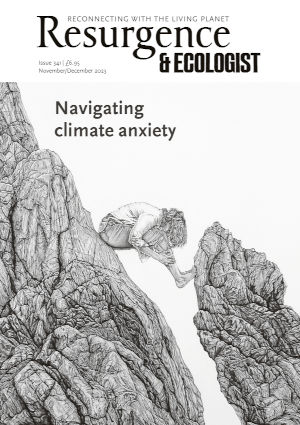In the “Robert Macfarlane Extended Universe”, as Richard Smyth rather mockingly referred to Nature writing in a 2020 essay for The Fence, Barry Lopez perhaps takes the role of a wise elder from a distant land. His work is referred to in ecstatic terms by fellow writers – his words and ideas “a substance coursing through your body”, according to Sierra Crane Murdoch. Macfarlane himself described Lopez as “the most important living writer about wilderness”. On Lopez’s death in 2020, laudatory obituaries described a serious, kind man, always willing to reach out to young writers. But, while ‘canonical’ in the US, Lopez is relatively less well-known in the UK, and Embrace Fearlessly the Burning World, a posthumous essay collection originally published in 2022, has gone somewhat under the radar.
For Lopez aficionados, this collection is relatively familiar territory. Lopez was a traveller, and the essays span different geographies, usually remote ones like Alaskan plains, polar sea ice, and his beloved home in rural Oregon. His writing is sparse, interrogative and precise, “observing the interplay of minute details … within the larger, overall picture, sensing the tension between the revelatory particular and general condition”. He exhorts readers to pay attention and to have a determination to know a particular place and “be known in return”. This is reflected in his work by shifts between exquis-itely observed extended descriptions of his wild surroundings and the conscious questions he asks himself as a writer, his mood, his worries.
This book does, however, reveal an older Lopez. Much of his writing has explored the gaps, differences and dislocations in the people and places he encountered, but many of these essays reflect on his reconciliation with them. In the latter third of the collection, Lopez remembers being sexually abused during his childhood by Harry Shier, a man posing as a doctor. He describes the conflict he felt in leaving California: relief at escaping Shier, but the loss of “barefoot days at the edge of suburbia” and a place he loved: “The ever-forgiving, ever-soothing light, the way it so beautifully bathed everything around it, the slender leaves of gum trees, the pale surfaces of adobe buildings, the surfaces of moving water”. He explains that in later life he ceased to look for information about what happened to Shier, several times observing that a flock of tumbler pigeons he identified with as a child had been a gift from Shier. It is altogether a less angry book than previous works – in 2019’s Horizon, Lopez relates hedge fund managers to suicide bombers – though without losing a precise moral clarity: “The writer is called upon especially to expose the notion of entitlement.”
This work is significant for being tightly focused on Lopez’s personal ideas and development. In this way it is also a collection that better overcomes the common critiques of his work – notably for being a white writer who often places himself in Indigenous people’s stories. In her introductory essay, Rebecca Solnit, herself a white writer, argues that Lopez “talked extensively and respectfully about contemporary Indigenous people when that was unusual in mainstream American writing”, but acknowledges that his perspectives “do not always seem of this very moment”. This is, ultimately, not entirely easy to shake. But this selection of essays is less about Lopez seeking to tell the stories of those he encounters than about his efforts to understand his role as an outsider and a listener. If you can trust his good intentions in this mission, then immersing yourself in his thoughtful process of “knowing” ultimately makes Embrace Fearlessly the Burning World a rewarding, humbling and moving read.
Embrace Fearlessly the Burning World by Barry Lopez. Notting Hill Editions, 2023. ISBN: 9781912559558.






